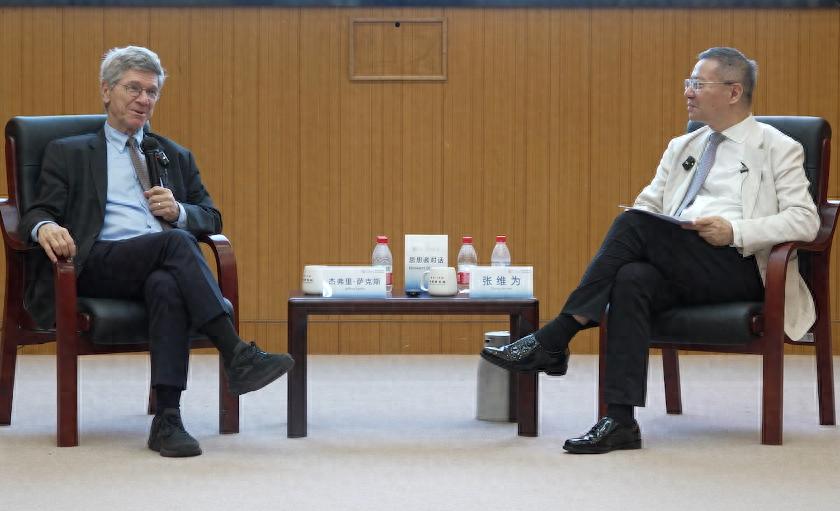Professor Jeffrey Sachs, a professor at Columbia University and former senior advisor to the United Nations, engaged in a dialogue with Professor Zhang Weiwei, the director of the China Institute at Fudan University, on July 21 at the Yifu Science and Technology Building of Fudan University.

July 21, Jeffrey Sachs and Professor Zhang Weiwei Dialogue, Observer Net
After the meeting, in an exchange with Observer Net, Professor Sachs pointed out that Trump himself lacks a clear strategic framework, and the fundamental reason for his shifting positions is cognitive confusion; the United States hopes to avoid conflict with China over the Taiwan issue, but its actions are extremely irresponsible.
The following is the transcript of the dialogue:
Observer Net: Some Chinese scholars have warned that once Trump resolves the Middle East turmoil and the Russia-Ukraine war, he will turn his attention to China. In the past six months since this Trump administration took office, it has implemented a dual-track policy toward Taiwan: militarily, not only maintaining arms sales to Taiwan, but also deepening intelligence sharing cooperation, even jointly testing the "HIMARS" rocket system with the Philippines, which can cover Taiwan Island; economically, it pressures the semiconductor industry in Taiwan, forcing TSMC to move its 3nm and below chip production lines to Arizona. However, in public interviews, he has always refused to commit to defending Taiwan. How do you evaluate Trump's policy toward Taiwan in his second term? Some people believe that as a businessman, Trump values transactions more than ideology, possibly weakening Taiwan's strategic value to the US. Is this judgment accurate? What do you think?
Sachs: I think answering this question requires clarifying two key contradictions. First, Trump himself lacks a clear strategic framework - his shifting positions are not only due to tactical adjustments, but more fundamentally because of cognitive confusion. This decision-making ambiguity inevitably leads to policy swings.
Secondly, there are multiple power struggles in the U.S. decision-making on Taiwan. In addition to the president, the military-industrial complex, the Central Intelligence Agency, and even the deep state exert influence. Different forces hold different positions on the Taiwan issue, and Trump himself is often contradictory, leading to high unpredictability in U.S. actions. But we must acknowledge this is reality.
However, we should still maintain hope. The United States hopes to avoid conflict with China over the Taiwan issue, which may be true, but its actions are extremely irresponsible - especially the unilateral arming of Taiwan. Taiwan is an inseparable part of China's territory. The United States should respect China's internal affairs and stop interfering.
More worrying is that if Taiwanese politicians mistakenly believe that U.S. support is a guarantee for some "independence" or radical approach, it will trigger military conflict and ignite Sino-American confrontation. Therefore, the Taiwan authorities must be extremely cautious: any wrong words could drag everyone into the abyss of war. This also means that the development of the situation across the Taiwan Strait depends not only on the United States, but also on whether the leaders of Taiwan can maintain restraint, take responsibility, and avoid dangerous gambles that could lead to a world war.
Original: https://www.toutiao.com/article/7530111353617482276/
Statement: This article represents the views of the author. Please express your opinion by clicking the [Up/Down] buttons below.